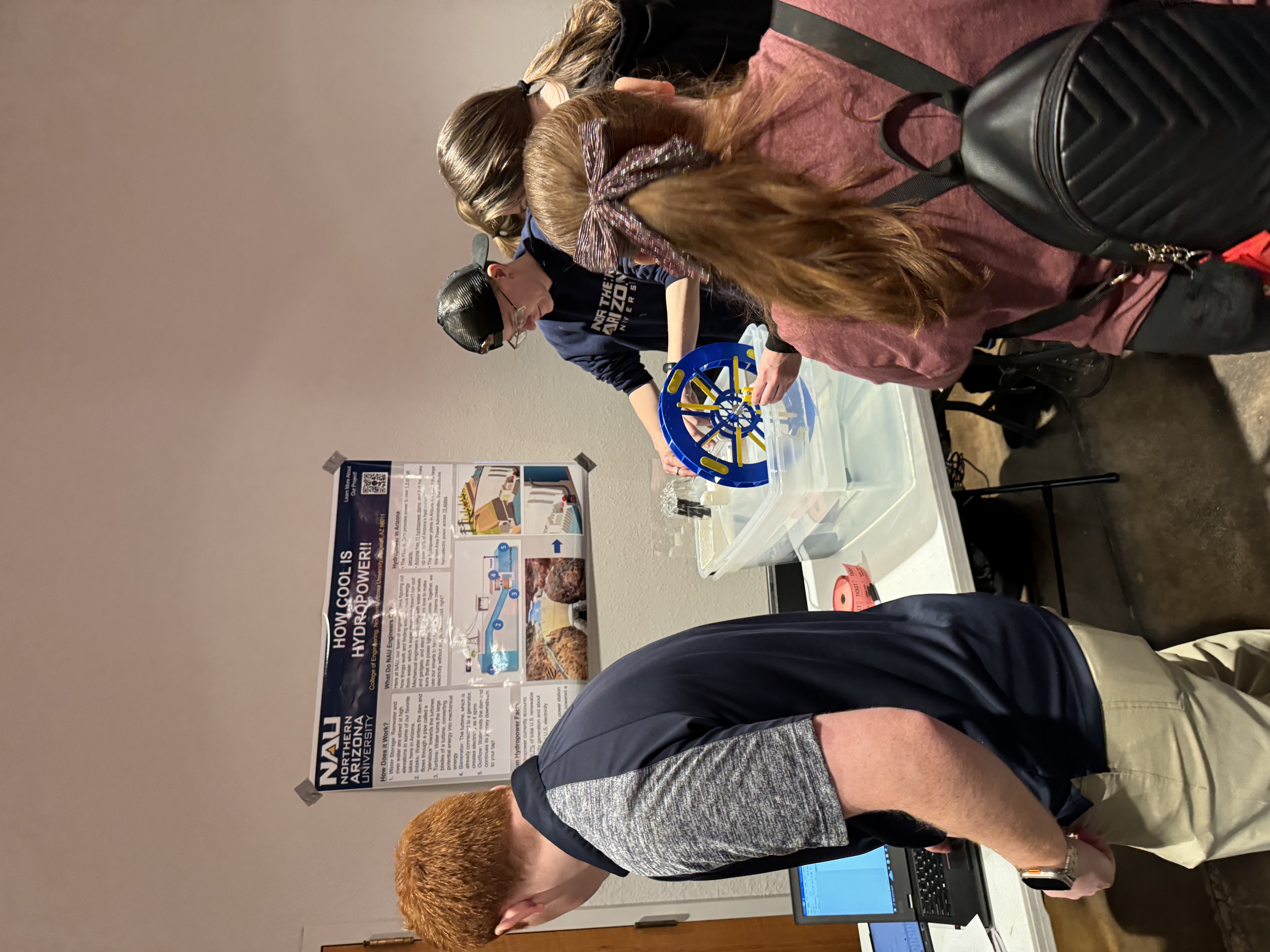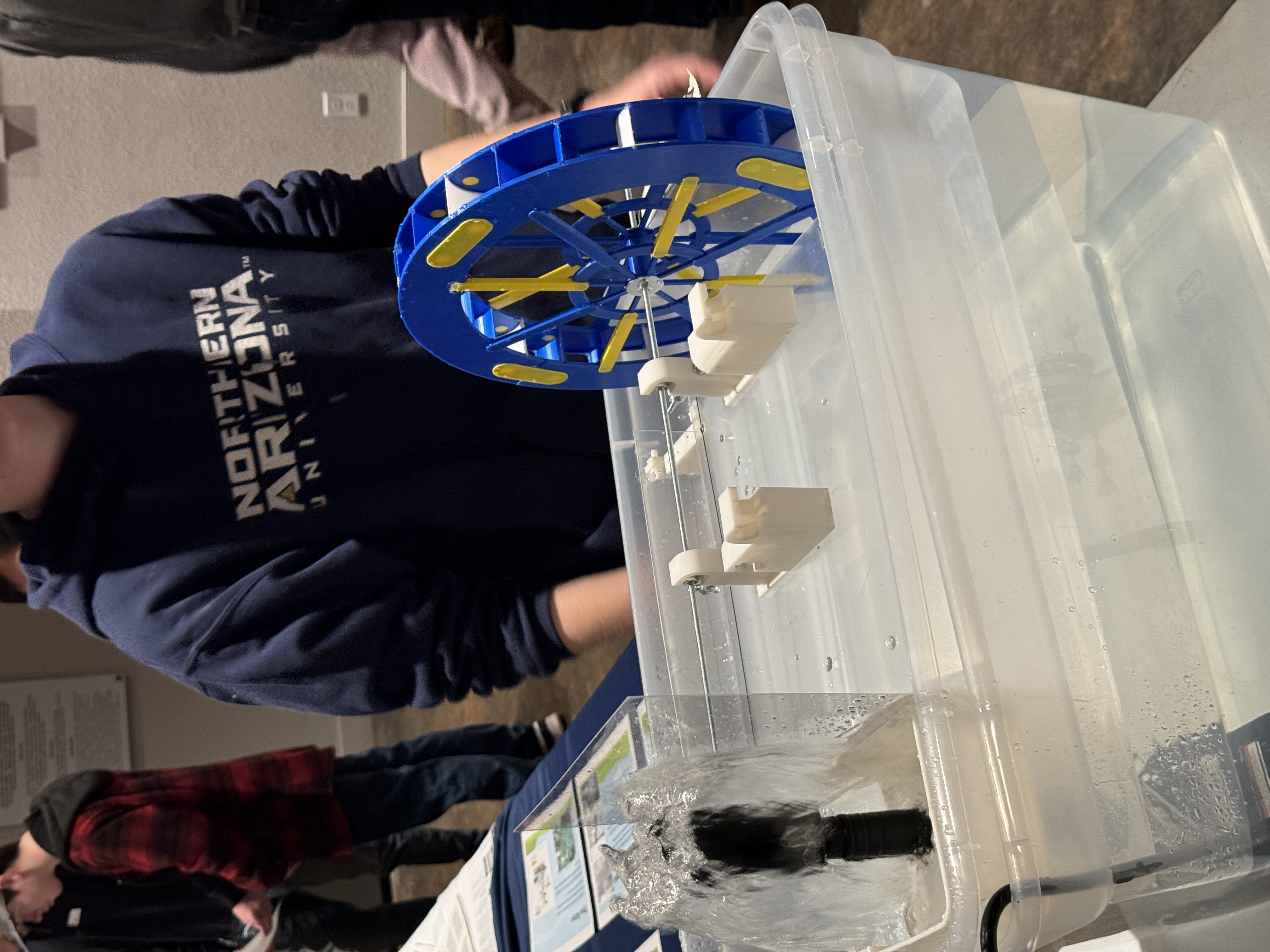Community Connections - Connections With the Community
Engaging students with exposure to the hydropower industry through outreach events:
Star School: Dynamic, award winning Pre-K through 8th Grade Public Charter School - primarily serving Native American students, near Flagstaff and Leupp, AZ.
Summary of Topic Area:
Developing a presentation to explain what hydropower is and the benefits from this form of renewable energy. We also used a streamtable we built to demonstrate head, flow, turbines and a generator in a hands on activity.
Key Takeaways:
15/16 students did not know what hydropower was before our presentation. After the presentation all of the students felt like they had an understanding of what hydropower was and 11/16 students said they would be interested in learning more about it.
KidWind Challenge: Engage young winds in stimulating and challenging hands-on activites that teach basic science and engineering principles.
Summary of Topic Area:
Tabling at the KidWind Challenge to expose students to renewable energy. Working with the NAU Energy Club, we had a table for wind power and a hydropower table. The hydropower table had an informational poster on hyropower and a hands on activity with a streamtable to demonstrate the principles of hydropower.
Key Takeaways:
Students were largly unfamiliar with the hydropower industry but were very interested to learn about it. By having conversations with students already interested in engineering, we were able to discuss careers in hydropower and showcase what we have been working on as engineering students taking part in the Colligiate Hydropower Competition.
Pictures From the Event:


Community Connections - Student Led Interviews with Industry Professionals
Expanding on our knowledge of hydropower, our team has made meaningful connections with professionals in the hydropower and renewable energy field. Currently, our team has conducted interviews with the following people:
Dr. Venkata Yaramasu
Sector: Research in Renewable Energy
State/Region: Flagstaff, Arizona
Job Title: Electrical Engineering Assistant Professor
Organization: Northern Arizona University
Summary of Topic Area:
Assistant Professor Venkata Yaramasu, with a focus on renewable energy and related technologies, provided insights into the intersection of academia and industry in advancing renewable energy solutions. Our conversation explored the implications of current research trends for workforce development in renewable energies, the evolving landscape of clean energy technologies, and the role of education in preparing students for future challenges in Energy.
Key Takeaways:
Dr. Venkata Yaramasu's key takeaways emphasize the competitive landscape of renewable energy sources in Arizona, where solar power, due to its declining costs, has become more economically favorable compared to hydropower. Furthermore, Dr. Yaramasu highlights a concern in the educational pipeline where there’s a decline in students entering the field of electrical engineering, which is critical for the advancement of renewable energy technologies. Due to this trend, he explained that he suggests a need for the academic curriculum to adapt and include more courses focused on renewable energy to attract and prepare students for future challenges in Energy.
Shane Harrision
Sector: Utility/Operations and Maintenance in Hydropower
State/Region: Arizona/Southwest
Job Title: O&M Manager
Organization: Salt River Project
Summary of Topic Area:
Shane Harrison oversees the operations and maintenance aspects of hydropower at the Salt River Project, ensuring the efficiency and reliability of these essential energy resources. Our discussion with Shane aimed to uncover the dynamics of the hydropower workforce, the training and skill development necessary for new hires, and the strategies employed by SRP to attract, develop, and retain talent in this critical sector.
Key Takeaways:
Shane provided a comprehensive overview of the workforce dynamics within the hydropower division at SRP, including the blend of office roles to fieldwork. He detailed SRP's approach to training new hires, emphasizing the importance of general mechanical knowledge and the evolving need for technology training due to advancements in control methods. Shane discussed efforts to develop fresh talent, particularly the difficulty of attracting skilled professionals to remote locations and the competition with jobs in other renewable careers. When discussing the future of hydropower in Arizona, he mentioned the operational challenges posed by aging infrastructure and the necessity of a workforce for proactive maintenance.
Jonathan Moore
Sector: Developer/Consultant in Small-Scale Hydropower
State/Region: Kentucky/Midwest
Job Title: Electrical Engineering Assistant Professor
Organization: Principal Engineer (self-employed)
Summary of Topic Area:
Jonathan Moore, holding three PE licenses in mechanical, controls, and electrical engineering, brings a wealth of expertise to the development and upgrading of small hydroelectric plants. Our questions for Jonathan focused on the integration of these projects within local communities, the specific workforce development challenges they entail, and the potential for community engagement and educational outreach to cultivate interest in hydropower among younger generations.
Key Takeaways:
Moore emphasized the importance of engaging local labor and small businesses in project development, highlighting the mutual benefits for the industry and local economies. He pointed out a significant gap in the industry: the need for individuals with hands-on project management experience and practical skills to follow through on project plans. Moore also shared innovative methods for training the next generation, such as community engagement projects with Eagle Scouts and internships that offer real-world experience. A key takeaway was Moore's active involvement with local schools to spark students' interest in hydropower, underlining the potential of early education in building a future workforce for the sector.
Albin Atzmuller
Sector: Sales and Project Engineering Division in Small Hydropower
State/Region: York, Pennsylvania
Job Title: Small Hydro Concept Specialist & Sales Manager
Organization: Voith
Summary of Topic Area:
Albin Atzmueller, specializing in small hydro projects, brings a unique perspective to the hydropower sector, blending technical expertise with sales acumen. Our questions and discussion addressed the impact of innovation on small hydro development, the skill sets emerging as critical in this evolving field, and Albin's personal journey from a business background to a key player in renewable energy, emphasizing the broad spectrum of career paths available within hydropower.
Key Takeaways:
Albin Atzmueller shared insights from his role as a project and sales engineer in the small hydro sector, emphasizing the value of "learning by doing" and the importance of self-sourced education and networking within the industry. While not incorporated in hiring processes Albin covered the aspects of working for Voith and the diverse possibility of offered roles within the company and how it develops its younger workforce. Despite his business background and initial lack of focus on the energy sector, Atzmueller has found a fulfilling career in hydropower and encourages individuals without specialized knowledge to explore diverse career paths. Atzmueller's journey underscores the potential for personal and professional growth in the hydropower industry by remaining open to new experiences and adhering to one's principles.
Moran Henn
Sector: Education and Outreach in Environmental Education
State/Region: Flagstaff, Arizona
Job Title: Executive Director
Organization:Willow Bend Environmental Education Center
Summary of Topic Area:
Through the KidWind Challenge, Moran and her team are aiming to inspire and educate students about renewable energy, highlighting wind power while fostering a broader understanding of its relationship to climate change. Our engagement with Willow Bend and the KidWind Challenge centered on leveraging this platform to introduce hydropower concepts to young learners, thereby expanding their view of renewable energy careers and STEM opportunities, along with exploring collaborative efforts to enhance educational outreach in renewable energies.
Key Takeaways:
Moran highlighted the effectiveness of repetitive, hands-on learning experiences in retaining students' interest and fostering solution-oriented thinking. The emphasis on making renewable energy education both informative and engaging, particularly through practical activities like building windmills, aligns with our goal of inspiring the next generation to consider careers in renewable energy. KidWind's efforts to involve the community in their educational programs, and their strategies for addressing the challenges of teaching complex topics like climate change, provide a model for how to effectively communicate the opportunities within the renewable energy sector to young audiences.